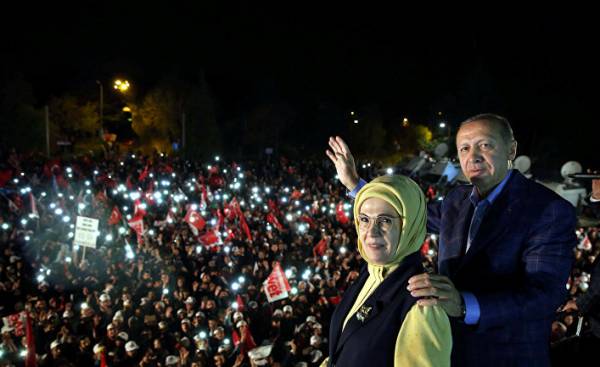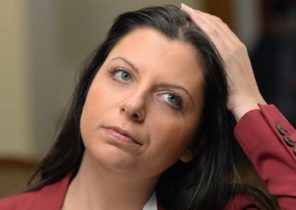
In Turkey, a revolution occurred: 16 April, President Recep Tayyip Erdogan has achieved victory in the referendum, after which the Constitution will be amended radically extending his powers. On the referendum voted only 51% of voters. It is much smaller than promised by the ruling party 60%, but enough to give Erdogan an absolute power over Turkey and at the same time to close the topic of the political Alliance with the EU countries. Perhaps such an outcome is quite satisfied both sides, but it is very dangerous for Turkish democracy.
The campaign before the referendum not be called calm and balanced. The government has achieved victory, through the administrative resource and a powerful apparatus of the ruling justice and development party (AKP). On the other hand, the Pro-Kurdish peoples Democratic party could not conduct a full-fledged campaign against amendment — its leaders arrested. Many opponents of constitutional change have become victims of attacks. The state of emergency imposed after the military coup in July 2016, provided the government additional control over the vote. But before summing up the Supreme electoral Council of Turkey has authorized the adoption of invalid ballots during the counting of votes.
Although opposition parties disputed the results of the referendum, the President of Turkey embarked on rapid implementation of reforms. Likely, Erdogan is trying to avoid the completely justifiable questions about the legitimacy of change. After the parliamentary elections in June 2015, the AKP failed to get a majority in the referendum in the three largest cities of Turkey — Ankara, Istanbul and Izmir — the majority voted against changing the Constitution. However, the Turkish authorities dismissed the comments of the Council of Europe and the OSCE, criticized the organization of the referendum.
While in Turkey extended a state of emergency, which gives the President wide powers for the period of constitutional reform. To wait for political moderation in such a situation is not worth it.
In the evening in day of voting on the constitutional amendments was announced that the government will start the recovery in Turkey of the death penalty. From this hasty step two motives. The first is to give the opposition to understand that the struggle with the authorities can result in death. Second — to save Ankara from having to officially declare itself to stop Turkey’s European integration. The AKP argues that the restoration of the death penalty, “the will of the people”, and in this situation, the EU can announce the termination of negotiations. And, if necessary, the Turkish government may hold a new referendum about the death penalty, and about relations with the EU.
Further the statement of Ankara will be more and more rigid. During the campaign, the Turkish authorities have dubbed the leaders of several European countries “aspiring Nazis” wanting “to revive the gas chamber,” and EU — “the rotten continent.” Anti-European rhetoric, and probably will continue to be one of the foundations of the foreign policy of Erdogan, a convenient excuse for authoritarianism.
Another target will be the United States in relations with Washington, Ankara has accumulated three painful unresolved issues. Firstly, it is unlikely that the United States will meet the requirement of the Turkish authorities to give them a preacher Fethullah Gulen. Second, in new York there is a lawsuit against Turkish businessman Reza Zarrab. He is accused that he has helped Iran circumvent international sanctions by organizing a large-scale scheme to sell gold. This trial is very concerned about the environment Erdogan. Thirdly, Ankara and Washington sharply divided on the question of the role of the Kurdish people’s protection units in Syrian conflict.
Yet in the split of Turkey’s ongoing debate about the fate of democracy, the EU will have to realize that in foreign policy, Turkey will now more resemble the Central Asian Republic than the democracy of the European sample. The EU’s political standards, the desire for which Turkey had once proclaimed, will now be pushed aside, and the authorities will claim that all this is done for the sake of democracy. Another consequence of the victory in the referendum will be anticelulitna revolution, the introduction in Turkey of the conservative religious social norms.
Amending the Constitution means the end of the political project of Turkey’s integration into the EU. It suits the Turkish government, since the restoration of the rule of law standards, would mean the limitation of presidential power. But, no matter how cynical it may sound, such an outcome will suit a number of EU leaders who either never believed in the European aspirations of Turkey, or disappointed with the changes that have occurred in the country in recent years.
Now relations between the EU and Turkey will be much more localized. Among the priorities — the modernization of the Customs Union of the EU and Turkey, strengthening counter-terrorism cooperation and the implementation of the final part of last year’s agreement on the refugee issue. Perhaps, Ankara will continue to repeat that shares European values and wants integration with EU, but after the entry into force of the constitutional reform believe it will be difficult. Alternatively, Brussels can agree on individual partnership agreement with Ankara by analogy with the new format of relations between the EU and Britain. At least it would have saved the relationship from many ambiguities.
As for personal relationships, it is unlikely that we will have the chance to see the Turkish President and European leaders together outside of the NATO summits and the G20. After the recent decisions and statements of the Turkish authorities, the leaders of the European countries would be very uncomfortable to be photographed with Erdogan. So that relationship will continue, but significantly cooled off.
Now for EU leaders is important not to lose hope in the return of Turkey to democracy and not to put a sign of equality between the leadership of the country and its citizens. The question of how the EU will cooperate with the Turkish Democrats, is of particular importance.







